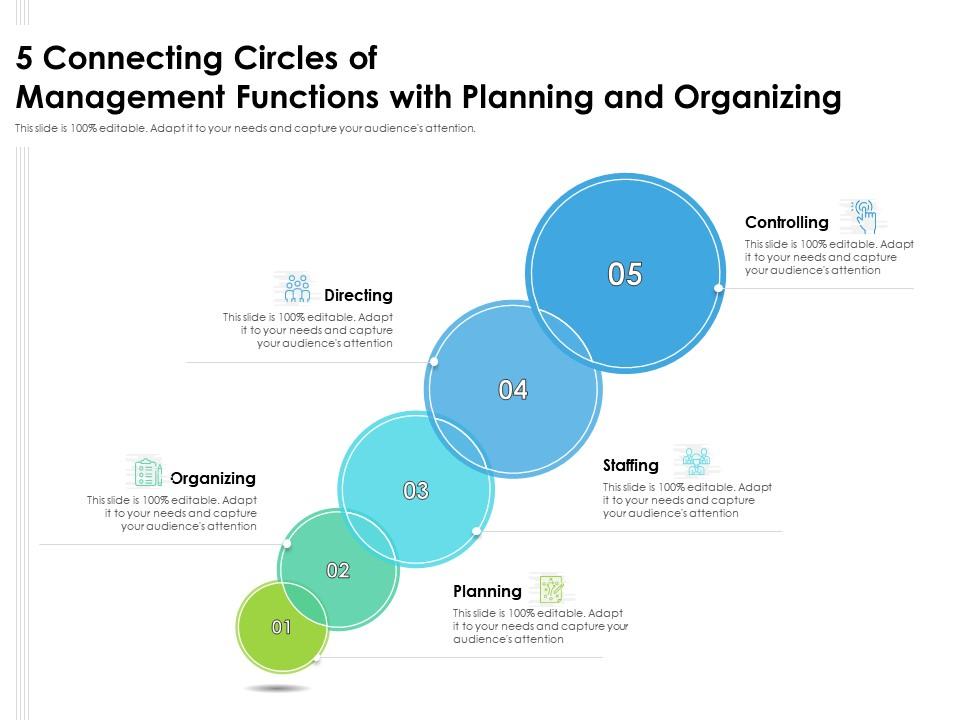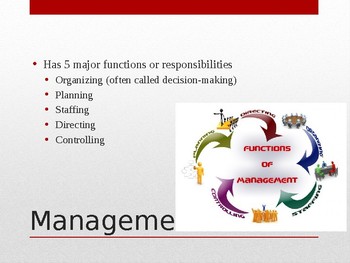Management is the process of achieving organizational goals through the effective use of resources such as people, money, and technology. There are several key functions that a manager performs in order to successfully achieve these goals and ensure the smooth running of a business or organization. These five functions of management are planning, organizing, leading, controlling, and decision-making.
Planning: Planning is the first and most important function of management. It involves setting specific goals and objectives for the organization, and developing a plan to achieve them. Planning involves analyzing the current situation, forecasting future trends, and determining the resources needed to achieve the desired outcomes. It helps managers to focus on the most important tasks and allocate resources effectively.
Organizing: Organizing is the process of arranging and coordinating the activities and resources of an organization in order to achieve the goals and objectives set out in the plan. It involves creating a structure for the organization, assigning tasks and responsibilities to individuals, and determining the relationships and communication channels within the organization. A well-organized organization is able to operate efficiently and effectively.
Leading: Leading is the process of inspiring and guiding others towards the achievement of goals and objectives. A manager who is effective at leading is able to motivate and engage their team, create a positive work environment, and inspire others to perform at their best. Leading also involves setting expectations, providing feedback, and coaching and developing team members.
Controlling: Controlling is the process of monitoring and adjusting the activities of an organization in order to ensure that they are aligned with the goals and objectives set out in the plan. It involves setting performance standards, measuring actual performance, and taking corrective action if necessary. Controlling helps managers to ensure that the organization is on track to achieve its goals and objectives.
Decision-making: Decision-making is an essential function of management, as it involves choosing among various alternatives in order to achieve the goals and objectives of the organization. It involves analyzing and evaluating options, considering the risks and benefits of each, and making a choice. Effective decision-making requires good problem-solving skills and the ability to think critically and creatively.
In conclusion, the five functions of management are essential for the successful operation of any organization. By effectively performing these functions, managers are able to achieve the goals and objectives of their organization and ensure its continued success.
Five Functions of management

In small businesses, managers have a broader range of roles. Fayol believes that planning is one of the most difficult and important tasks for management, in which the entire organization must take an active part. When applied effectively, these functions can help to ensure that an organization runs smoothly and efficiently. All employees that hire under the recruitment department or those who advertise and sell the product served under marketing and sales, and those who actually make the product or services work under productions or operations. They act as a connection between top-level management and lower-level management.
The Five Functions of Management and Their Role in a Business

This is facilitated by proper resource allocation and the recruitment of individuals who are suitably qualified. However, some changes can be added to improve relations within a given unit without any reconsideration of the work of the whole corporation. In large organizations, they may perform all functions. It is that part of managerial function which actuates the organizational methods to work efficiently for achievement of organizational purposes. Depending on the exact scope of an organization, the strategic planning process can look ahead as far as ten years or more.
Functions of management

Therefore, making rational decisions is vital for a company if they want to do well. Performance is then measured periodically to identify and address problems that may relate to the employees themselves or with processes. It involves setting objectives, making plans, and then taking action to ensure that those plans are executed effectively. Planning Deciding in advance : What to do How to do When to do Who is going to do it Bridges a gap between where we are today and where we want to reach. Managers can brainstorm various alternatives to achieve the goal before deciding on the best course of action. The purpose of the meeting is as follows: "The meeting should inform the management of the company's work, discuss issues of cooperation between the various departments, and address issues of common interest. For the department that includes 100 employees 10 supervisors and 90 packers , there is an essential need for the implementation of specific skills to create conditions beneficial for the future rise of the unit.
Five Functions of Management: Definition and Practical Examples

Thousands of professionals around the world are already well acquainted with and apply BVOP principles in their work. Go a head replace with your own text Place your text here, this is an example text. Their authority is limited. Management of a business has been characterized as a social activity that entails the responsibility for economic and effective planning and control of its activities in order to achieve set goals. They create Place your text here, thisand loyalty and eliminate replace unity, energy, initiative is an example text.
The five functions of Fayol's management

Its image is shaped by the employees. It presupposes grouping people and activities into departments that can accomplish specific and narrow goals faster and with better results Baack et al. In 1916, Fayol published his greatest work, the book Industrial and General Administration. Fayol argued that regular meetings were also a good way to solidify relationships between different departments or activities. Sets the goal of an organization. To define management in the business world, it is the organization of activities of a company to reach defined objectives. It is expected that the given approach to the organization might help to improve the work of the unit and achieve better results.
5 Functions of Management

Organizing is called the backbone of management, organizing is a grouping of activities together. These four functions are called the POSDCORB model of management. But, Every manager starts deciding in advance the objectives of an enterprise and how to fulfill these objectives. Leadership- may be defined as a process by which manager guides and influences the work of subordinates in desired direction. Go a head replace with your own textDownload the slides at www. Operational planning connects strategic and tactical goals by defining the daily actions required to achieve them.
Functions of Management 101

Which is a characteristic of the process of Management? Research shows that 85% of individuals accept the importance of the climate within a collective and recognize its strong influence on performance Baack et al. Coordination aims to ensure optimal harmony between the various activities of the organization. The process of determining the best course of action to take in order to achieve desired goals is known as planning. Managers must have a thorough understanding of the materials, personnel, and budgets at their disposal in order to create optimally productive systems and relationships. It can consist of specialists from other departments, companies, or the employment market who are attracted by an opportunity to work in Amazon. These functions are essential for managers at all levels of an organization.
5. Functions of Management.

Thus, planning is the systematic consideration of methods and means for achieving predetermined goals. Suggesting corrective measures come on the path of plan 19. The most successful and profitable businesses in the world attribute a lot of it to their management skills Five Functions of Management There are more functions of management than the ones listed below, but these are considered the most important. Go a with your own text your own text head replace with Place your text here, this is an example text. The matrix is a variation on the SWOT Analysis, and it seeks to address criticisms of the SWOT Analysis regarding its inability to show relationships between the various categories.







